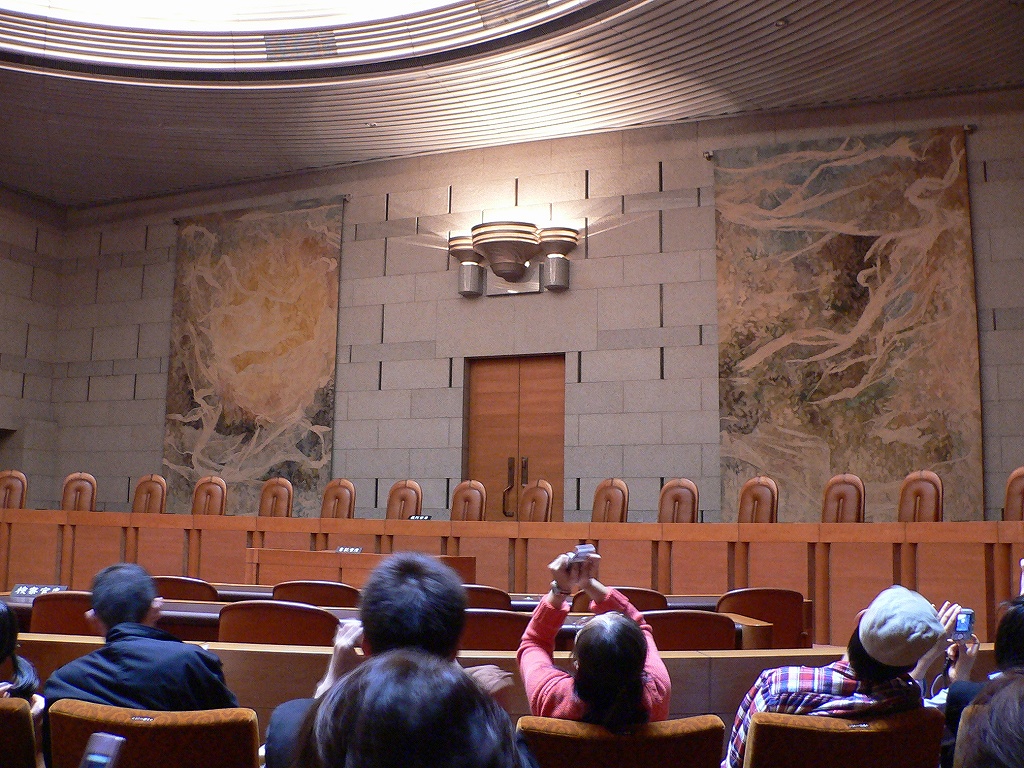|
Supreme Court Of Japan
The , located in Hayabusachō, Chiyoda, Tokyo, is the highest court in Japan. It has ultimate judicial authority to interpret the Japanese constitution and decide questions of national law. It has the power of judicial review, which allows it to determine the constitutionality of any law or official act. History The modern Supreme Court was established in Article 81 of the Constitution of Japan in 1947. There was some debate among the members of the SCAP legal officers who drafted the constitution and in the Imperial Diet meeting of 1946 over the extent of the power of the judiciary, but it was overshadowed by other major questions about popular sovereignty, the role of the emperor, and the renunciation of war. Although the ratified wording in Article 81 states that the court possesses the power of judicial review, a part of the court's early history involved clarifying the extent of this power. In 1948, the court declared that the constitution meant to establish the type ... [...More Info...] [...Related Items...] OR: [Wikipedia] [Google] [Baidu] |
Chiyoda, Tokyo
, known as Chiyoda City in English, ." ''City of Chiyoda''. Retrieved on December 28, 2008. is a Special wards of Tokyo, special ward of Tokyo, Japan. Located in the heart of Tokyo's 23 special wards, Chiyoda consists of Tokyo Imperial Palace, the Imperial Palace and a surrounding radius of about a kilometer (1000 yards), and is known as the political and financial center of Japan. As of October 2020, the ward has a population of 66,680, and a population density of 5,709 people per km2 (14,786 per sq. mi.), making it by far the least populated of the special wards. The residential part of Chiyoda is at the heart of Yamanote and Shitamachi, Yamanote, Tokyo's traditional upper-class residential area, with Banchō, Kōjimachi, and Kioichō, Chiyoda, Tokyo, Kioichō considered the most exclusive neighbourhoods in the entire city. ... [...More Info...] [...Related Items...] OR: [Wikipedia] [Google] [Baidu] |
Liberal Democratic Party (Japan)
The , frequently abbreviated to LDP, the Lib Dems, or , is a major conservativeThe Liberal Democratic Party is widely described as conservative: * * * * * and Japanese nationalism, nationalistSources describing the LDP as nationalist: * * * * * * A Weiss (31 May 2018). Towards a Beautiful Japan: Right-Wing Religious Nationalism in Japan's LDP. List of political parties in Japan, political party in Japan. Since its foundation in 1955, the LDP has been in power almost continuously—a period called the 1955 System—except from 1993 to 1996, and again from 2009 to 2012. The LDP was formed in 1955 as a merger of two conservative parties, the Liberal Party (Japan, 1950), Liberal Party and the Japan Democratic Party, and was initially led by Prime Minister of Japan, prime minister Ichirō Hatoyama. The LDP supported Japan's alliance with the United States and fostered close links between Japanese business and government, playing a major role in the country's Japanese eco ... [...More Info...] [...Related Items...] OR: [Wikipedia] [Google] [Baidu] |
Tokyo Imperial Palace
is the main residence of the Emperor of Japan. It is a large park-like area located in the Chiyoda, Chiyoda, Tokyo, Chiyoda district of the Chiyoda, Tokyo, Chiyoda ward of Tokyo and contains several buildings including the where the Emperor has his living quarters, the where various ceremonies and receptions take place, some residences of the Imperial House of Japan, Imperial Family, an archive, museums and administrative offices. The palace grounds and gardens are built on the site of the old Edo Castle. History Edo castle After the capitulation of the Tokugawa shogunate, shogunate and the Meiji Restoration, the inhabitants, including the Shōgun Tokugawa Yoshinobu, were required to vacate the premises of the Edo Castle. Leaving the Kyoto Imperial Palace on November 26, 1868, the Emperor arrived at the Edo Castle, made it to his new residence and renamed it to . At this time, Tōkyō had also been called Tōkei. He left for Kyōto again, and after coming back on May ... [...More Info...] [...Related Items...] OR: [Wikipedia] [Google] [Baidu] |
Mandatory Retirement
Mandatory retirement also known as forced retirement, enforced retirement or compulsory retirement, is the set age at which people who hold certain jobs or offices are required by industry custom or by law to leave their employment, or retire. As of 2017, as reported by the Organisation for Economic Co-operation and Development (OECD), only three European member states (UK, Denmark and Poland) and four OECD countries (Canada, Australia, New Zealand, United States) had laws banning mandatory retirement. Rationale Typically, mandatory retirement is justified by the argument that certain occupations are either too dangerous (military personnel) or require high levels of physical and mental skill ( air traffic controllers, airline pilots). Most rely on the notion that a worker's productivity declines significantly after age 70, and the mandatory retirement is the employer's way to avoid reduced productivity. However, since the age at which retirement is mandated is often somewhat ar ... [...More Info...] [...Related Items...] OR: [Wikipedia] [Google] [Baidu] |
Asahi Shimbun
is a Japanese daily newspaper founded in 1879. It is one of the oldest newspapers in Japan and Asia, and is considered a newspaper of record for Japan. The ''Asahi Shimbun'' is one of the five largest newspapers in Japan along with the ''Yomiuri Shimbun'', the ''Mainichi Shimbun'', the ''The Nikkei, Nihon Keizai Shimbun'' and ''Chunichi Shimbun''. The newspaper's circulation, which was 4.57 million for its morning edition and 1.33 million for its evening edition as of July 2021, was second behind that of the ''Yomiuri Shimbun''. By print circulation, it is the second List of newspapers in the world by circulation, largest newspaper in the world behind the ''Yomiuri'', though its digital size trails that of many global newspapers including ''The New York Times''. Its publisher, is a media conglomerate with its registered headquarters in Osaka. It is a privately held company, privately held family business with ownership and control remaining with the founding Murayama and Uen ... [...More Info...] [...Related Items...] OR: [Wikipedia] [Google] [Baidu] |
Retention Election
A retention election or retention referendum is a referendum where voters are asked if an office holder, usually a judge, should be allowed to continue in that office. The judge is removed from office if a majority of votes are cast against retention. Retention elections are held periodically, usually at the same time as a general election. A judicial retention vote differs from a regular election in that voters are not asked to choose from a list of candidates — the judges on the ballot do not have opponents. Rather, the voter chooses between electing the incumbent judge to a further term in office (i.e. voting in favor of "retention") or voting against. They are usually nonpartisan, as the judge's party affiliation, if any, typically is not listed on the ballot. A judge is deemed to have been retained if ballots cast in favor of retention outnumber those against. By way of example, judicial retention elections are used in the U.S. state of Illinois. In the 2008 general ele ... [...More Info...] [...Related Items...] OR: [Wikipedia] [Google] [Baidu] |
Emperor Of Japan
The emperor of Japan is the hereditary monarch and head of state of Japan. The emperor is defined by the Constitution of Japan as the symbol of the Japanese state and the unity of the Japanese people, his position deriving from "the will of the people with whom resides sovereign power". The Imperial Household Law governs the line of Succession to the Japanese throne, imperial succession. Pursuant to his constitutional role as a national symbol, and in accordance with rulings by the Supreme Court of Japan, the emperor is personally sovereign immunity, immune from prosecution. By virtue of his position as the head of the Imperial House of Japan, Imperial House, the emperor is also recognized as the head of the Shinto religion, which holds him to be the direct descendant of the sun goddess Amaterasu. According to tradition, the office of emperor was created in the 7th century BC, but the first historically verifiable emperors appear around the 5th or 6th centuries Anno Domini, AD ... [...More Info...] [...Related Items...] OR: [Wikipedia] [Google] [Baidu] |
Quorum
A quorum is the minimum number of members of a group necessary to constitute the group at a meeting. In a deliberative assembly (a body that uses parliamentary procedure, such as a legislature), a quorum is necessary to conduct the business of that group. In contrast, a plenum is a meeting of the full (or rarely nearly full) body. A body, or a meeting or vote of it, is quorate if a quorum is present (or casts valid votes). The term ''quorum'' is from a Middle English wording of the commission formerly issued to justices of the peace, derived from Latin ''quorum'', "of whom", genitive plural of ''qui'', " who". As a result, ''quora'' as plural of ''quorum'' is not a grammatically well-formed Latin-language construction. In modern times a quorum might be defined as the minimum number of voters needed for a valid election. Quorums are often required by traditional handbooks of parliamentary procedure such as Robert's Rules of Order. However, quorums have been criticized by s ... [...More Info...] [...Related Items...] OR: [Wikipedia] [Google] [Baidu] |
Bench (law)
Bench used in a legal context can have several meanings. First, it can simply indicate the location in a courtroom where a judge sits. Second, the term bench is a metonym used to describe members of the judiciary collectively, or the judges of a particular court, such as the King's Bench or the Common Bench in England and Wales, or the federal bench in the United States. Third, the term is used to differentiate judges, who are referred to as "the bench", from attorneys or barristers, who are referred to as " the bar". The phrase "bench and bar" denotes all judges and lawyers collectively. The term "full bench" is used when all the judges of a certain court sit together to hear a case, as in the phrase "before the full bench", which is also referred to as . The historical roots of the term come from judges formerly having sat on long seats or benches (freestanding or against a wall) when presiding over a court. The bench is usually an elevated desk area that allows a ju ... [...More Info...] [...Related Items...] OR: [Wikipedia] [Google] [Baidu] |
The Grand Bench Of The Japanese Supreme Court
''The'' is a grammatical article in English, denoting nouns that are already or about to be mentioned, under discussion, implied or otherwise presumed familiar to listeners, readers, or speakers. It is the definite article in English. ''The'' is the most frequently used word in the English language; studies and analyses of texts have found it to account for seven percent of all printed English-language words. It is derived from gendered articles in Old English which combined in Middle English and now has a single form used with nouns of any gender. The word can be used with both singular and plural nouns, and with a noun that starts with any letter. This is different from many other languages, which have different forms of the definite article for different genders or numbers. Pronunciation In most dialects, "the" is pronounced as (with the voiced dental fricative followed by a schwa) when followed by a consonant sound, and as (homophone of the archaic pronoun ''thee' ... [...More Info...] [...Related Items...] OR: [Wikipedia] [Google] [Baidu] |





